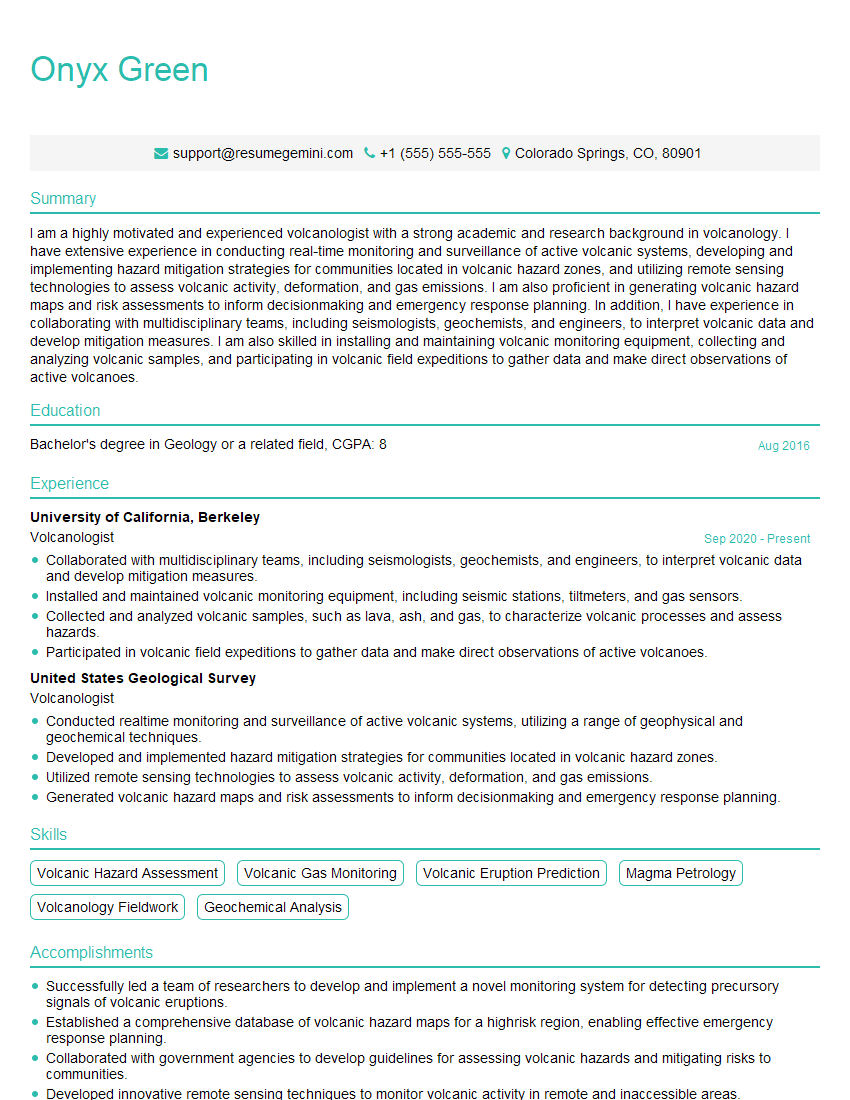Are you a seasoned Volcanologist seeking a new career path? Discover our professionally built Volcanologist Resume Template. This time-saving tool provides a solid foundation for your job search. Simply click “Edit Resume” to customize it with your unique experiences and achievements. Customize fonts and colors to match your personal style and increase your chances of landing your dream job. Explore more Resume Templates for additional options.

Onyx Green
Volcanologist
Summary
I am a highly motivated and experienced volcanologist with a strong academic and research background in volcanology. I have extensive experience in conducting real-time monitoring and surveillance of active volcanic systems, developing and implementing hazard mitigation strategies for communities located in volcanic hazard zones, and utilizing remote sensing technologies to assess volcanic activity, deformation, and gas emissions. I am also proficient in generating volcanic hazard maps and risk assessments to inform decisionmaking and emergency response planning. In addition, I have experience in collaborating with multidisciplinary teams, including seismologists, geochemists, and engineers, to interpret volcanic data and develop mitigation measures. I am also skilled in installing and maintaining volcanic monitoring equipment, collecting and analyzing volcanic samples, and participating in volcanic field expeditions to gather data and make direct observations of active volcanoes.
Education
Bachelor’s degree in Geology or a related field
August 2016
Skills
- Volcanic Hazard Assessment
- Volcanic Gas Monitoring
- Volcanic Eruption Prediction
- Magma Petrology
- Volcanology Fieldwork
- Geochemical Analysis
Work Experience
Volcanologist
- Collaborated with multidisciplinary teams, including seismologists, geochemists, and engineers, to interpret volcanic data and develop mitigation measures.
- Installed and maintained volcanic monitoring equipment, including seismic stations, tiltmeters, and gas sensors.
- Collected and analyzed volcanic samples, such as lava, ash, and gas, to characterize volcanic processes and assess hazards.
- Participated in volcanic field expeditions to gather data and make direct observations of active volcanoes.
Volcanologist
- Conducted realtime monitoring and surveillance of active volcanic systems, utilizing a range of geophysical and geochemical techniques.
- Developed and implemented hazard mitigation strategies for communities located in volcanic hazard zones.
- Utilized remote sensing technologies to assess volcanic activity, deformation, and gas emissions.
- Generated volcanic hazard maps and risk assessments to inform decisionmaking and emergency response planning.
Accomplishments
- Successfully led a team of researchers to develop and implement a novel monitoring system for detecting precursory signals of volcanic eruptions.
- Established a comprehensive database of volcanic hazard maps for a highrisk region, enabling effective emergency response planning.
- Collaborated with government agencies to develop guidelines for assessing volcanic hazards and mitigating risks to communities.
- Developed innovative remote sensing techniques to monitor volcanic activity in remote and inaccessible areas.
- Established a network of realtime seismic and geochemical monitoring stations to enhance early warning systems for volcanic eruptions.
Awards
- Received the American Geophysical Unions Outstanding Student Paper Award for research on volcanic ash transport dynamics.
- Awarded the International Association of Volcanology and Chemistry of the Earths Interiors Young Scientist Award for outstanding research in volcanic geochemistry.
- Recognized with the National Science Foundations Early Career Development Award for research on the role of magma degassing in volcanic eruptions.
- Received the Geological Society of Americas G.K. Gilbert Award for significant contributions to the field of volcanology.
Certificates
- IAVCEI Professional Volcanologist
- Certified Geospatial Analyst (GIS)
Career Expert Tips:
- Select the ideal resume template to showcase your professional experience effectively.
- Master the art of resume writing to highlight your unique qualifications and achievements.
- Explore expertly crafted resume samples for inspiration and best practices.
- Build your best resume for free this new year with ResumeGemini. Enjoy exclusive discounts on ATS optimized resume templates.
How To Write Resume For Volcanologist
- Highlight your experience in real-time monitoring and surveillance of active volcanic systems.
- Demonstrate your skills in developing and implementing hazard mitigation strategies for communities located in volcanic hazard zones.
- Showcase your proficiency in utilizing remote sensing technologies to assess volcanic activity, deformation, and gas emissions.
- Emphasize your ability to generate volcanic hazard maps and risk assessments to inform decisionmaking and emergency response planning.
Essential Experience Highlights for a Strong Volcanologist Resume
- Conduct real-time monitoring and surveillance of active volcanic systems, utilizing a range of geophysical and geochemical techniques.
- Develop and implement hazard mitigation strategies for communities located in volcanic hazard zones.
- Utilize remote sensing technologies to assess volcanic activity, deformation, and gas emissions.
- Generate volcanic hazard maps and risk assessments to inform decisionmaking and emergency response planning.
- Collaborate with multidisciplinary teams, including seismologists, geochemists, and engineers, to interpret volcanic data and develop mitigation measures.
- Install and maintain volcanic monitoring equipment, including seismic stations, tiltmeters, and gas sensors.
- Collect and analyze volcanic samples, such as lava, ash, and gas, to characterize volcanic processes and assess hazards.
Frequently Asked Questions (FAQ’s) For Volcanologist
What is the role of a volcanologist?
Volcanologists study volcanoes and volcanic eruptions, including their causes, their effects on the environment, and their potential hazards.
What are the educational requirements for becoming a volcanologist?
A bachelor’s degree in geology or a related field is typically required for entry-level positions as a volcanologist.
What are the job prospects for volcanologists?
The job outlook for volcanologists is expected to be good over the next few years, as there is an increasing demand for scientists who can assess volcanic hazards and develop mitigation strategies.
What are the key skills for volcanologists?
Volcanologists need to have a strong understanding of geology, geophysics, and geochemistry, as well as experience with field work and data analysis.
What are the challenges of working as a volcanologist?
Volcanologists often work in remote and hazardous environments, and they may need to travel to active volcanoes to collect data and make observations.